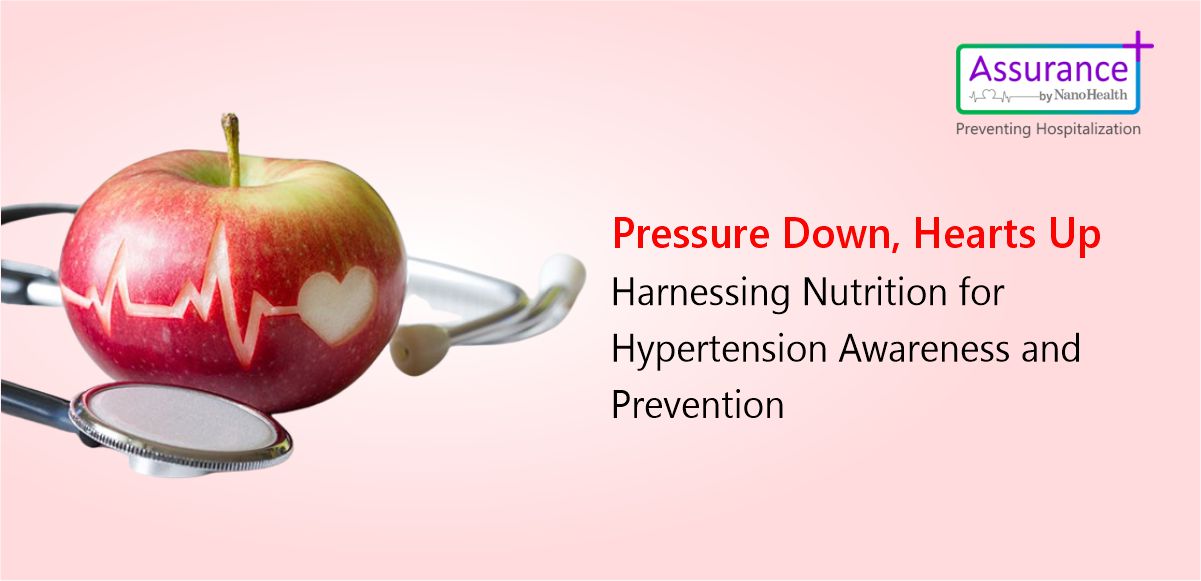

Hypertension, commonly known as high blood pressure, is a silent killer that affects millions worldwide. It’s a significant risk factor for heart disease, stroke, and other cardiovascular complications. While medication can help manage hypertension, lifestyle factors, particularly nutrition, play a pivotal role in its prevention and management. In this article, we delve into the impact of nutrition on hypertension awareness and prevention, highlighting key dietary strategies to keep our pressure down and hearts up.
Understanding Hypertension:
Hypertension occurs when the force of blood against the walls of the arteries is consistently too high. This can damage artery walls over time, leading to serious health complications. Several factors contribute to hypertension, including genetics, age, obesity, lack of physical activity, and poor dietary choices.
Nutrition's Role in Hypertension Prevention:
Dietary habits have a profound impact on blood pressure regulation. A diet rich in processed foods, excessive sodium, saturated fats, and refined sugars can contribute to hypertension. Conversely, adopting a balanced, heart-healthy diet can help prevent and manage high blood pressure.
Key Nutritional Strategies:
Nutritional strategies for managing hypertension (high blood pressure) often involve reducing sodium intake, increasing potassium intake, consuming a balanced diet rich in fruits and vegetables, moderating alcohol consumption, and maintaining a healthy weight. Here are some specific strategies:
Reduce Sodium Intake: High sodium intake is associated with elevated blood pressure. Aim to consume less than 2,300 milligrams of sodium per day, and ideally closer to 1,500 milligrams per day, especially if you have hypertension.
Increase Potassium Intake: Potassium helps balance the effects of sodium on blood pressure. Foods rich in potassium include bananas, oranges, spinach, sweet potatoes, avocados, and tomatoes.
Follow the DASH Diet: The Dietary Approaches to Stop Hypertension (DASH) diet emphasizes fruits, vegetables, whole grains, lean proteins, and low-fat dairy products. It is designed to help lower blood pressure and improve overall health.
Limit Alcohol: Excessive alcohol consumption can raise blood pressure. Limit alcohol intake to moderate levels, which is generally defined as up to one drink per day for women and up to two drinks per day for men.
Watch Portion Sizes: Even healthy foods can contribute to weight gain and elevated blood pressure if consumed in large quantities. Pay attention to portion sizes to avoid overeating.
Increase Magnesium Intake: Magnesium may help regulate blood pressure. Foods high in magnesium include leafy green vegetables, nuts, seeds, and whole grains.
Limit Processed Foods: Processed and packaged foods often contain high levels of sodium. Opt for fresh, whole foods whenever possible.
Choose Healthy Fats: Replace saturated and trans fats with healthier fats such as monounsaturated and polyunsaturated fats found in olive oil, nuts, seeds, and fatty fish like salmon.
Maintain a Healthy Weight: Obesity is a significant risk factor for hypertension. Adopting a balanced diet and engaging in regular physical activity can help achieve and maintain a healthy weight, thus reducing the risk of high blood pressure.
Monitor Caffeine Intake: While caffeine may temporarily raise blood pressure, its long-term effects are still debated. If you’re sensitive to caffeine, consider limiting your intake or opting for decaffeinated beverages.
Manage Stress: Chronic stress can contribute to hypertension. Practice stress-reducing techniques such as meditation, deep breathing exercises, yoga, or engaging in hobbies to promote relaxation and overall well-being.
RECIPES:
Moong Chawli Salad: Moong/green gram helps in counteracting the effects of sodium and chawli/cowpea rich in potassium controls blood pressure.
To make this healthy salad, add boiled cowpea or lobia in a bowl, 1/2 cup steamed green moong, 1/2 tsp lemon juice, 1/2 onion, 1 tomato, 2 tsp roasted cumin, 1 tsp dry mango powder. Mix well and garnish with coriander leaves. Serve.
Quick Beet Juice: helps to lower blood pressure due to its high nitrate content and antioxidant properties.
Blend together 1 peeled beetroot, 1 peeled carrot, 1 cored apple, and a 1-inch piece of peeled ginger until smooth. Add a splash of water if needed. Optionally, stir in lemon juice for flavor. Strain if desired, then serve immediately. Enjoy!
Conclusion:
Hypertension is a serious health concern with far-reaching consequences, but it is largely preventable and manageable through lifestyle modifications, with nutrition playing a central role. By adopting a heart-healthy diet rich in fruits, vegetables, whole grains, and lean proteins, while minimizing sodium, saturated fats, and refined sugars, individuals can effectively lower their blood pressure and reduce their risk of cardiovascular disease. Let’s prioritize our health by making informed dietary choices, keeping our pressure down, and our hearts up for a healthier tomorrow.
Assurance by NanoHealth: Your Trusted Healthcare Provider
Achieving tangible results with dietary interventions for health often involves a combination of strategic planning, consistency, and individualized approaches.
Remember, individual responses to dietary changes can vary. What works for one person may not work for another. Therefore, a personalized and evidence-based approach, guided by healthcare professionals, is essential for achieving positive outcomes in managing better health through dietary interventions.
At Assurance by NanoHealth, we understand the unique dietary needs according to the health conditions. Our personalized dietitians offer a comprehensive solution tailored to address the specific challenges associated with senior health. We prioritize assisting you in maintaining a balanced diet that caters to your changing nutritional requirements, safeguarding against health issues related to any deficiencies. Under our expert guidance, you can relish a wholesome and nourishing diet that promotes your overall well-being and keeps your blood pressure in check, thereby mitigating the risk of cardiac complications.
Let our team guide you towards embracing the changes in your health with vitality and optimal well-being. Book your consultation now and embark on a journey towards better health! Call +91 9100444004 or visit our website www.nhassurance.com to get started.
